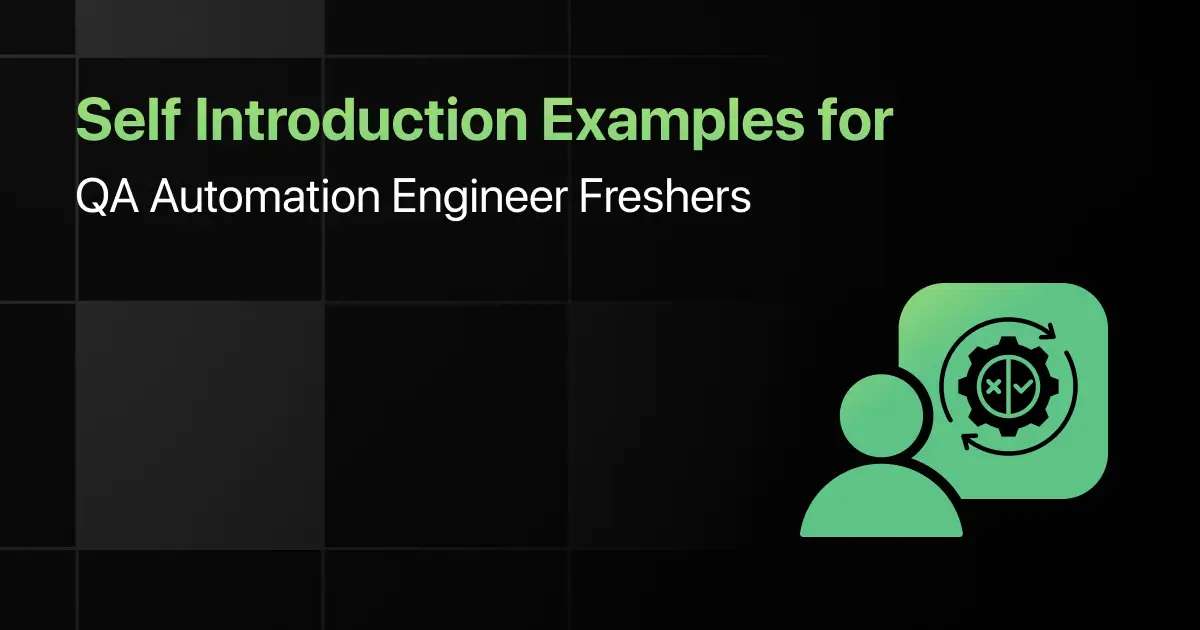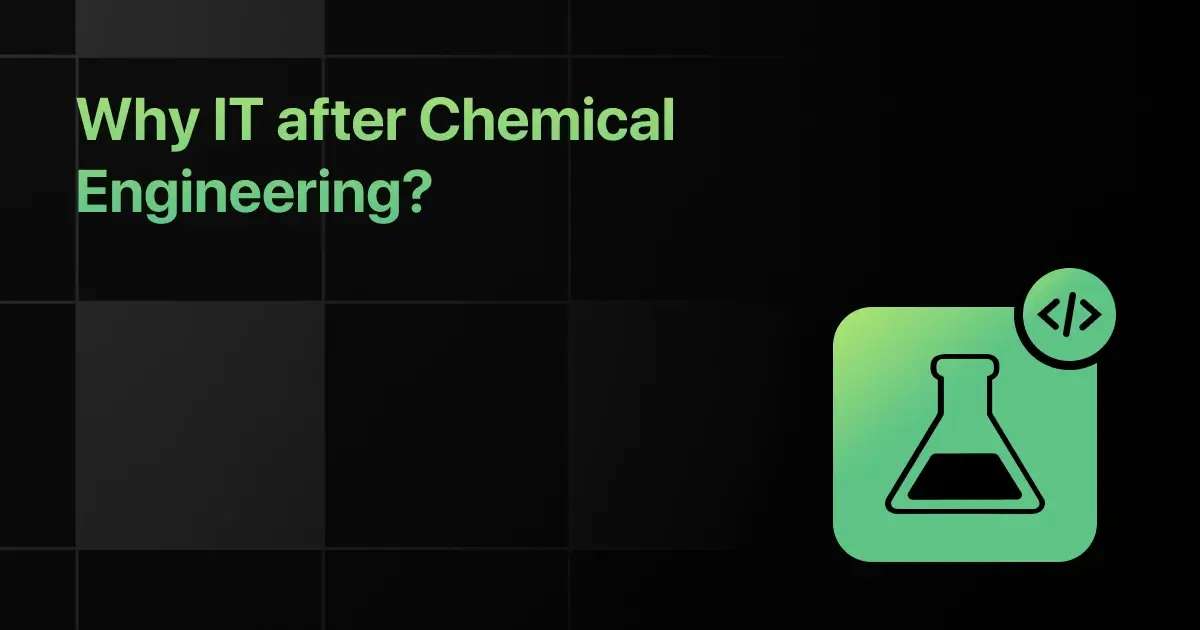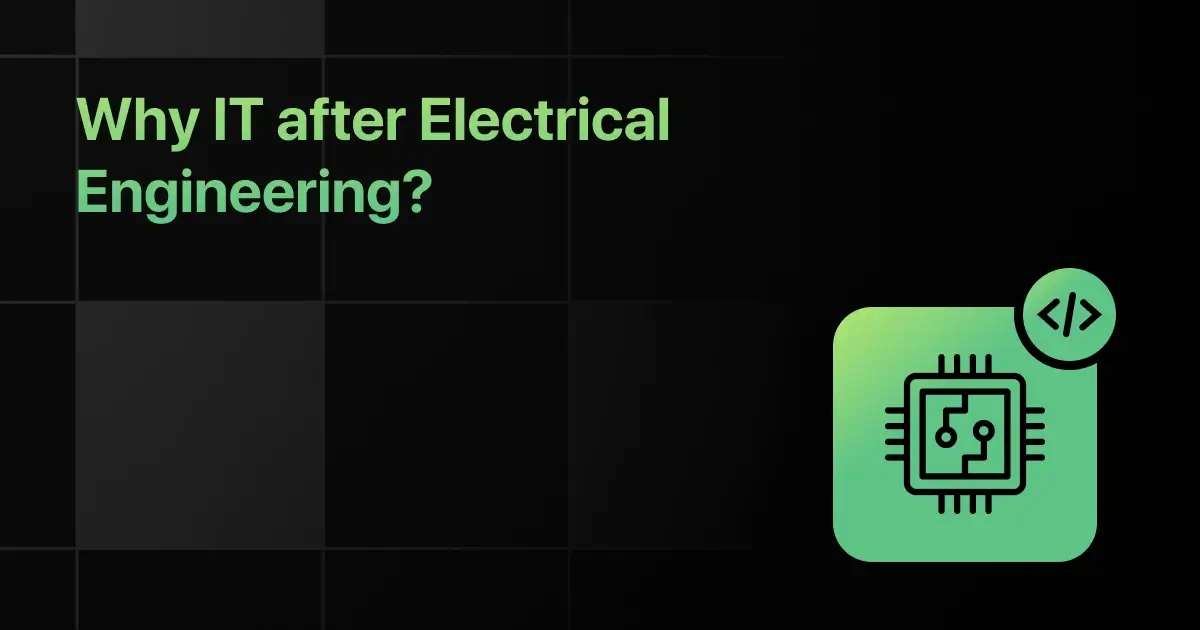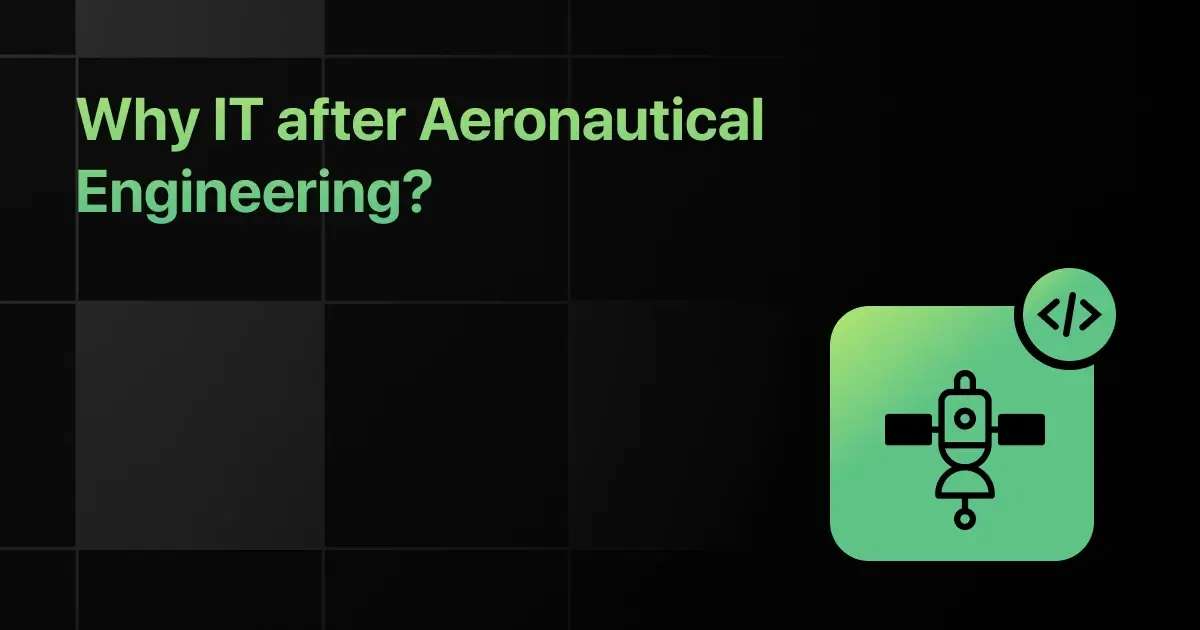Self Introduction Examples for QA Automation Engineer Freshers

Are you ready to step into the world of quality assurance and automation testing?
Crafting a solid self-introduction for a QA automation engineer fresher can be your first step to standing out in this competitive field.
Self Introduction Examples for QA Automation Engineers
Below are the 5 self-introduction examples for QA automation engineers:
1. Job Application Introduction
I’m Priya, a recent Computer Science graduate from Greenfield University.
I focused on software testing and automation during my studies, and for my final project, I created an automated testing suite for an e-commerce platform that cut testing time by 40%.
I’m excited to use my skills in Selenium, Python, and Java to help improve software quality with your team.
Template Version
I’m [Your Name], a recent [Your Degree] graduate from [Your University] with a focus on [Your Specialization].
For my final project, I worked on [describe your project briefly], which helped achieve [mention any significant outcome].
I’m excited to bring my skills in [mention specific tools or languages you know] to help improve software quality with your team.
Logic Behind This
This introduction is simple and direct, sharing what you studied, a key project, and the skills you’ll bring to the job.
It helps employers quickly understand your background and interest in the role without too much detail.
Mistakes to Avoid
- Being vague about skills: Mention the specific tools and skills you know to make your abilities clear.
- Leaving out project results: Sharing the impact of your project shows what you can achieve.
- Not mentioning the company or role: Make sure to show your interest in the job by connecting your skills to the team’s needs.
2. Networking Introduction
Hi, I’m Priya! I just graduated in Computer Science from Greenfield University, where I focused on software testing and automation.
I built an automated test suite for an e-commerce platform as my final project, which cut testing time by 40%.
I’m here to connect with others in the field and learn more about new tools and trends in QA automation. I’d love to chat if you’re interested in similar topics!
Template Version
Hi, I’m [Your Name]! I recently graduated in [Your Degree] from [Your University], with a focus on [Your Specialization].
I worked on [describe your project or experience briefly], which helped achieve [mention any significant outcome].
I’m here to meet others in [mention the field or area of interest] and learn more about [mention what you want to learn about]. Let’s connect if you share similar interests!
Logic Behind This
This introduction is designed to help you connect with others in your field by briefly sharing your background, skills, and interests.
It’s friendly, straightforward, and shows that you’re open to learning and making connections with others.
Mistakes to Avoid
- Being too formal: Keep the tone light and friendly to encourage conversation.
- Leaving out key details: Mention your specialization and any relevant experience.
- Not showing interest in others: Show that you’re open to learning, not just talking about yourself.
- Skipping the invitation to chat: End with an invitation to connect to make your introduction more interactive.
3. Postgraduate University Application Introduction
I’m Priya, a recent Computer Science graduate from Greenfield University with a focus on software quality assurance and automation.
My final project was developing an automated testing suite for an e-commerce platform, which reduced testing time by 40% and improved accuracy.
I’m applying to your Master’s program to deepen my skills in QA automation and learn about advanced testing techniques.
I’m excited about the opportunity to contribute to research in this field and work with experts on innovative testing solutions.
Template Version
Hello, I’m [Your Name], a recent [Your Degree] graduate from [Your University] specializing in [Your Specialization].
For my final project, I developed [describe your project briefly], which helped achieve [mention any significant outcome].
I am applying to your Master’s program to expand my knowledge in [mention specific area of interest] and learn advanced techniques in [mention another related area].
I’m eager to work alongside experts in the field and contribute to research and projects that push the boundaries of [mention the field].
Logic Behind This
This introduction highlights your educational background, specific project experience, and your reason for applying to a postgraduate program.
It shows your interest in deepening your knowledge for the learning and research opportunities the program offers.
Mistakes to Avoid
- Leaving out project results: Mention the outcomes of your project to demonstrate your practical skills and impact.
- Being too general about interests: Specify your areas of interest to show that you’re clear on what you want to study.
- Skipping why you chose the program: Explain why this specific program is a great fit for your goals, showing you’ve done your research.
4. Professional Conference Introduction
Hi, I’m Priya! I recently graduated in Computer Science from Greenfield University, where I focused on software testing and automation.
For my final project, I built an automated testing suite that reduced testing time for an e-commerce platform by 40%.
I’m here to connect with other QA professionals to discuss any exciting projects or trends you’re working on!
Template Version
Hi, I’m [Your Name], a recent [Your Degree] graduate from [Your University] with a focus on [Your Specialization].
I recently worked on [describe your project briefly], which helped achieve [mention any significant outcome].
I’m attending this conference to connect with other professionals about any new projects or trends you’re exploring!
Logic Behind This
This introduction is short and friendly, highlights your background and experience, and expresses interest in learning from others and discussing current industry trends.
It opens the door to valuable conversations with professionals in the same field.
Mistakes to Avoid
- Being too detailed about your project: Keep the description brief to avoid overwhelming people with technical information.
- Sounding too reserved: Show enthusiasm for connecting with others by inviting conversation.
- Skipping your reason for attending: Mention specific topics or tools you’re interested in to make your introduction more engaging.
- Leaving out an invitation to chat: End with an open invitation to talk, showing you’re approachable and interested in learning from others.
5. Online Profile Introduction
Hi! I’m Priya, a recent Computer Science graduate with a focus on software quality assurance and automation.
I developed an automated testing suite for an e-commerce platform that reduced testing time by 40%.
I’m here to connect with other QA and automation professionals, exchange ideas, and stay updated on the latest tools and trends.
Let’s connect if you’re interested in automation, testing, or innovative QA solutions!
Template Version
Hello! I’m [Your Name], a recent [Your Degree] graduate with a focus on [Your Specialization].
I worked on [describe your project briefly], which achieved [mention any significant outcome].
I’m am eager to connect with other professionals in [mention your field].
Let’s connect if you’re interested in discussing ideas or staying updated on the latest trends in [mention your area of interest]!
Logic Behind This
This introduction is ideal for professional networking platforms like LinkedIn, where it’s important to quickly convey your skills, experience, and interest.
It invites others to engage, share insights, and connect over common interests in QA and automation.
Mistakes to Avoid
- Leaving out specifics about your skills: Mention your key skills, like automation or specific testing platforms, to attract relevant connections.
- Skipping an invitation to connect: Encourage others to reach out, making it easier to start professional conversations.
- Being too lengthy: Keep it brief to ensure your main points stand out and are easy to read at a glance.
Final Words
A clear self-introduction sets the stage for your journey as a QA automation engineer.
It’s your chance to showcase your passion for quality and commitment to ensuring top-notch software performance.
Frequently Asked Questions
1. How should a QA automation engineer fresher introduce themselves in an interview?
A QA automation engineer fresher should start by introducing their name, educational background, and technical skills relevant to QA and automation.
2. What key elements to include in a fresher’s self-introduction for QA automation engineering roles?
Key elements include educational qualifications, familiarity with programming languages and automation tools (e.g., Selenium, Java, Python), knowledge of testing frameworks, and any relevant projects.
3. What common mistakes should QA automation engineer freshers avoid in their self-introduction?
Freshers should avoid using overly technical language without context, providing irrelevant personal details, or downplaying their abilities.
4. Should freshers highlight academic projects during self-introductions?
Yes, freshers should highlight academic projects that are relevant, especially those involving testing or automation.
5. How can QA automation engineering freshers talk about internships during their introduction?
When discussing internships, freshers should mention the company, their specific responsibilities in QA, and any tools or frameworks they used.
6. What is an effective way for freshers to wrap up their self-introduction?
An effective way for freshers to wrap up their self-introduction is by reiterating their enthusiasm for the role and the company.
7. What is the ideal length for a self-introduction for freshers in QA automation engineering?
The ideal length for a self-introduction for freshers in QA automation engineering is about 60 to 90 seconds.
Explore More Self Introductions
Related Posts

How to Answer: Why IT After Chemical Engineering?
Switching from chemical engineering to IT might feel like a big change—after years of working with reactions, processes, and materials, …






